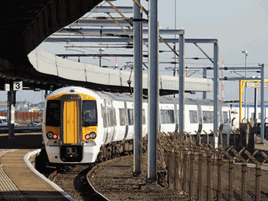Before the General Election, there was criticism from anti-rail privatisation campaigners that much of the UK’s passenger rail network was run by the state concerns of other European countries, and even by companies from as far away as Hong Kong.
Through their international offshoots, the likes of Deutsche Bahn (Germany), SNCF (France) and Nederlandse Spoorwegen (the Netherlands) have gained considerable footholds in Britain’s rail market, both in franchised and non-franchised operators, in partnerships with British headquartered companies and on their own.
In some cases, the experience of running specific types of railway service in other countries has given these companies (such as MTR with London Overground) a unique selling point and experience that can be applied to the UK network.
But despite this multi-country, globalised influence, it doesn’t work the other way (except in infrastructure through Network Rail International consulting arm). The Railways Act 1993 specifically forbids UK public sector operators from running rail franchises except as the “operator of last resort”.
This was why East Coast survived as a publicly-owned company for nearly six years - and why a company owned by the Department for Transport will never, under the UK’s current prevailing politics, seek to run the railway franchises of any other country.
The result is an ever-increasing, mainly European influence on Britain’s railways, essentially dominated by three big groups with considerable non-UK influence. And current franchise competitions where shortlisted bidders have been announced illustrate that point.
These groups are involved in franchises in many other countries - particularly Germany, France and the Netherlands, plus several Eastern European former Soviet Bloc states. And it is overwhelmingly a story of German dominance.
One of the biggest players is Arriva, originally a British company but now owned by Deutsche Bahn. It is particularly active in the Netherlands, but operates several train routes in the Czech Republic as a subcontractor of state operator Ceské dráhy. It has also tried running commercial services (similar to the UK’s ‘open access’ operators) between Prague and Kralupy nad Vltavou, in competition with Ceské dráhy.
In Denmark, Arriva began operating franchised services on the Varde-Nørre Nebel line, and in March 2012 was awarded a new franchise until June 2018.
In the Netherlands, Arriva established the joint venture NoordNed with Nederlandse Spoorwegen in 1999, taking 100% ownership in 2003 and dropping the name NoordNed two years later.
It is currently two thirds of the way through a 15-year contract to run Groningen-Leeuwarden-Delfzijl-Roodeschool-Nieuweschans trains in the north of the country. It also secured a contract to operate Leeuwarden-Harlingen Haven trains, and trains to Stavoren.
Further south, it secured a contract to operate trains from Dordrecht to Gorinchem and on to Geldermalsen (MerwedeLingelijn).
In 2012, Arriva began operating trains in the Achterhoek region and between Zwolle and Emmen, under the Spurt brand. And in December 2015, it will begin operating a service between The Hague and Brussels.
In Poland, Arriva formed a partnership in December 2006 with PCC Rail (a Deutsche Bahn company, later renaming it Arriva RP after taking 100% control of the business). This operates services on all non-electrified lines in the Kuyavian-Pomeranian Voivodeship.
And in Sweden, Arriva operates the Kinnekulletåget between Gothenburg and Örebro. DB Regio Sverige AB started to operate regional trains on the Östgötapendeln commuter rail system in December 2010, with the company renamed Arriva Östgötapendeln the following year.
SNCF, the French state operator, also has many rail interests that reach beyond its own country’s borders. It owns outright or has shares in numerous rail or transport-related companies, primarily through Keolis but also by association (Govia, see panel). But it also operates TGV and Thalys services that cross national boundaries across Europe.
In essence, the rail market is incredibly diverse. And it looks set to remain that way as legislative changes make their mark on the European Union.
- This feature was published in RAIL 777 on June 24 2015














Login to comment
Comments
No comments have been made yet.